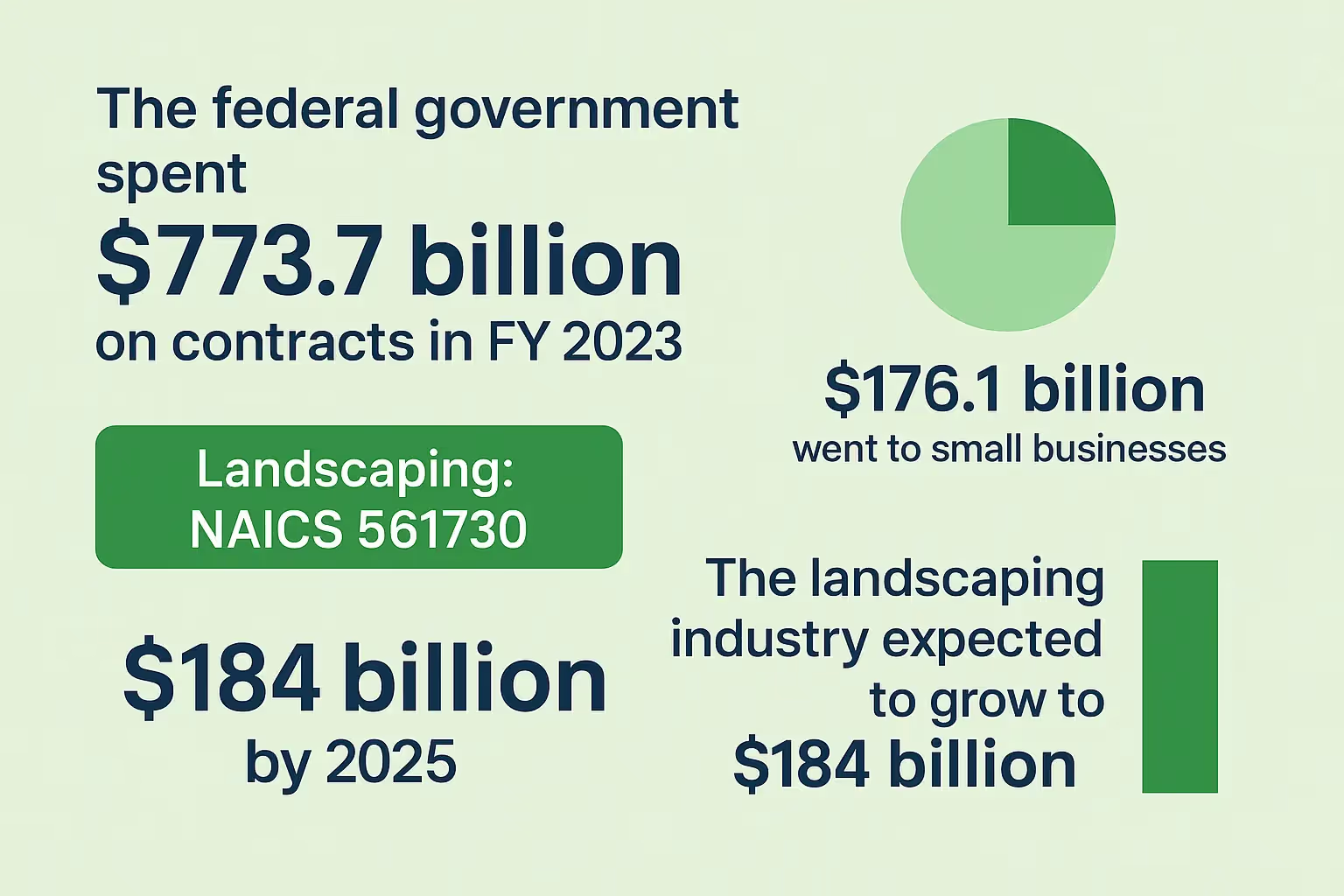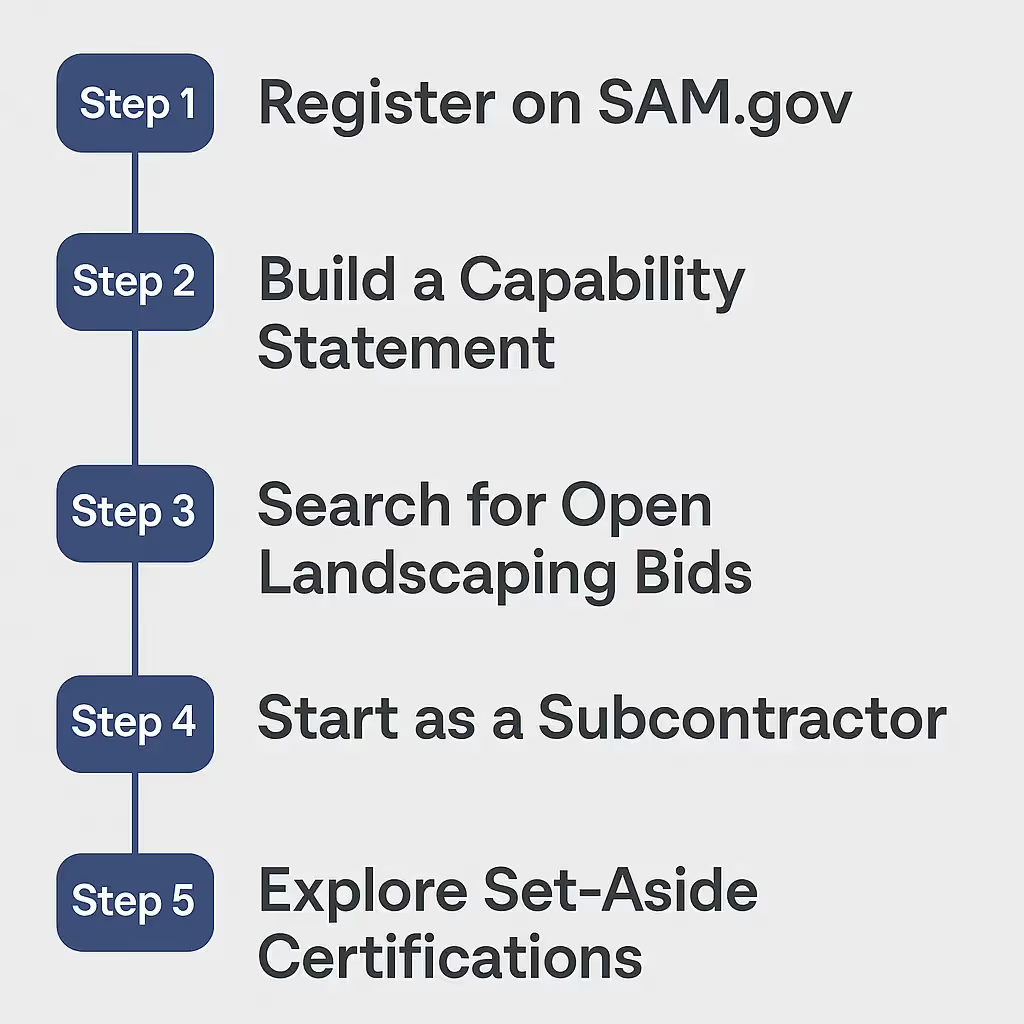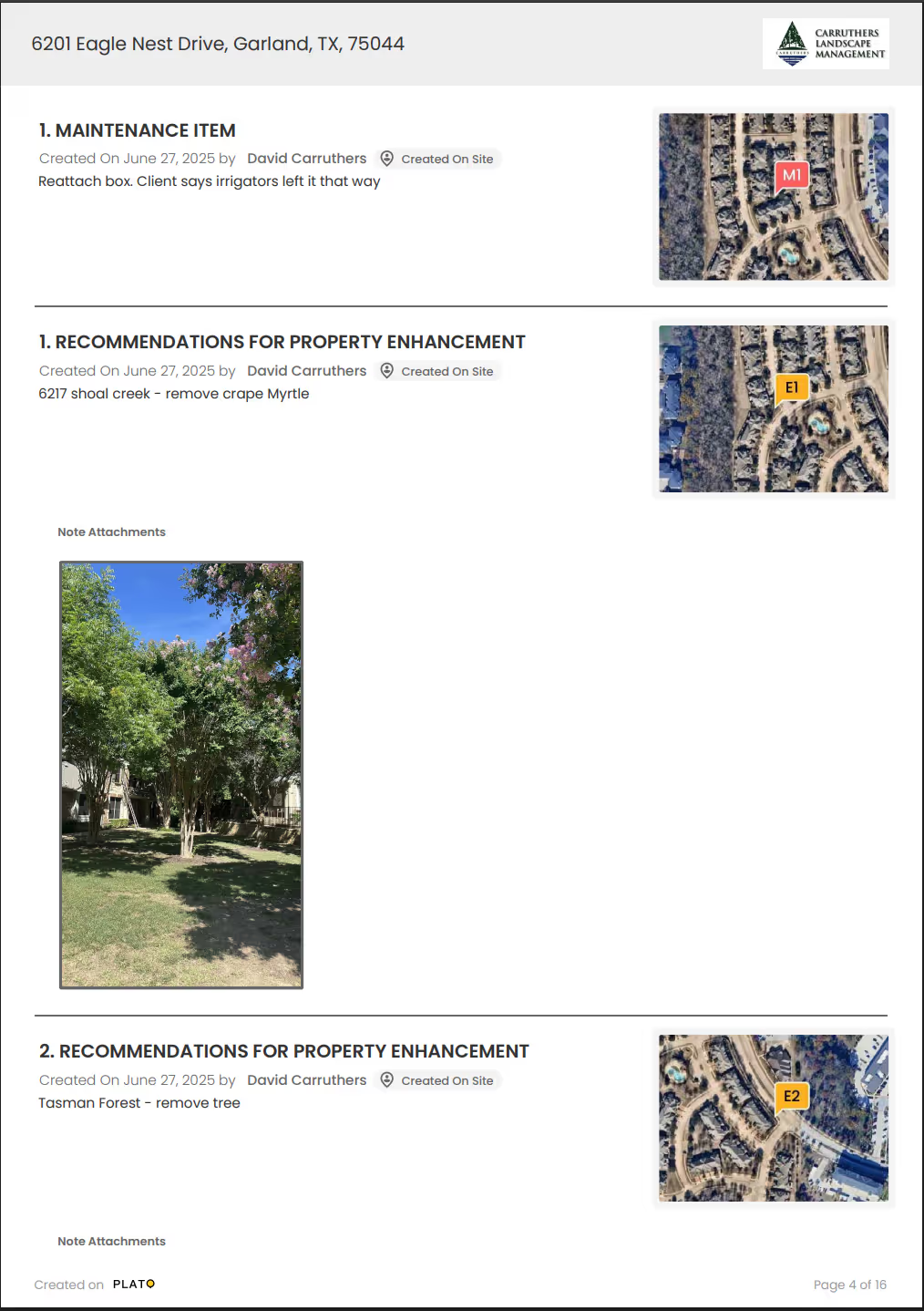How to Get Government Landscaping Contracts?
Learn how to get government landscaping contracts with this step-by-step guide. Discover bidding tips, licensing needs, and tools to win contracts faster.
.avif)
Key Takeaways:
Government landscaping contracts offer commercial landscapers a stable, recurring revenue stream- often through multi-year agreements with federal, state, or local agencies. This comprehensive guide explains how to get government landscaping contracts by walking through the steps: registering on SAM.gov, creating a compelling capability statement, tracking bids, starting with subcontracting, and leveraging small business certifications like HUBZone or 8(a). It also highlights common mistakes landscapers make when bidding and how tools like SiteRecon’s AI Takeoffs and Estimator can streamline the process. Whether you're a seasoned contractor or just exploring public sector work, this guide helps you bid smarter and win faster.
Government landscaping contracts are one of the most reliable and overlooked growth opportunities for commercial landscapers. Whether you’re running a $1M company or scaling to $10M+, landing a single government contract can mean recurring revenue, better margins, and stable off-season work.
In this guide, you’ll learn how to get government landscaping contracts, what government agencies look for in landscaping vendors, how to avoid common bidding mistakes, and how to prepare your business to win.
Let’s dig in.
What are Government Landscaping Contracts?
Federal, state, and local agencies all procure landscaping services. Here are just a few examples:
- Municipalities: Maintaining parks, medians, libraries, city buildings
- Federal agencies: Military bases, federal buildings, veterans’ cemeteries
- Public schools & universities: Routine lawn care and seasonal cleanups
- Transportation departments: Right-of-way mowing, erosion control
- Housing authorities: Groundskeeping for public housing units
These aren’t one-off mow-and-go jobs but they’re bundled contracts that cover dozens (sometimes hundreds) of sites.
P.S. - Use SAM.gov to explore recent awards under NAICS 561730. You’ll see everything from $5,000 jobs to $5 million multi-site contracts.
Why Go After Government Landscaping Contracts?
You might be thinking, “Why go through all this red tape when I already have commercial clients?”
Here’s why:
- Stability: Government contracts offer recurring, long-term work that’s far less volatile than the private sector.
- Predictability: Multi-year maintenance contracts mean consistent revenue, even in slow seasons.
- Credibility: Winning a government bid is like a stamp of approval. It boosts your reputation with private clients too.
Let’s look at the numbers:

- he federal government spent $773.7 billion on contracts in FY 2023.
- $176.1 billion of that went to small businesses.
- Landscaping falls under NAICS 561730, a category with consistent demand across all levels of government.
- The overall landscaping industry is projected to grow to $184 billion by 2025, with public sector contracts driving a chunk of that expansion.
If you're trying to build a business that isn't just surviving season to season, this is a playbook worth learning.
Related Article: How to Obtain Your Landscaping License in California
How to Get Government Landscaping Contracts: Step-by-Step

If you’re just starting out or considering bidding for the first time, here’s a simple breakdown of how to get government landscaping contracts for your business:
Step 1: Register on SAM.gov
The System for Award Management (SAM.gov) is your entry point. You must register your business here to bid on federal contracts. You’ll need:
- A Unique Entity ID (UEI)
- NAICS code 561730
- Bank details, tax ID, ownership info
- DUNS number (still required by some local agencies)
Once registered, contracting officers can find your company when landscaping bids are posted.
Tip: Use the Landscape Proposal Checklist to get your documentation in order.
Step 2: Build a Capability Statement
This is your business resume for government buyers. It should include:
- Company overview and differentiators
- Core services (like turf care, tree pruning, irrigation)
- Past performance and commercial jobs count too
- Geographic reach and certifications
- Contact details and SAM UEI
Use this Needs Assessment Guide to position your capabilities around what decision-makers actually care about like proactive service, accuracy, and reliability.
Step 3: Search for Open Landscaping Bids
Now it’s time to find opportunities. Use these platforms:
- SAM.gov – Federal opportunities
- State/local procurement portals – Every state has its own
- Private aggregators – e.g., BidNet, iSqFt, Onvia
Search with filters like:
- “landscaping services”
- “grounds maintenance”
- “mowing”
- “tree removal”
- “erosion control”
You can also save searches or set email alerts for your service region.
Step 4: Start as a Subcontractor
If you’re not confident bidding as a prime contractor yet, subcontracting is your gateway.
- Connect with general contractors already doing public projects
- Offer to handle the landscaping portion
- Use the job as a past performance credential
One of SiteRecon’s customers started this way, delivering AI-generated site measurements to a GC bidding on a parks and rec contract. The fast turnaround and professional estimates helped them win the work and build a relationship that turned into multiple jobs.
Step 5: Explore Set-Aside Certifications
Want a competitive edge? Get certified.
These programs reserve government landscaping contracts for specific business categories:
In FY 2023 alone, over $15B in contracts went to HUBZone and 8(a) firms.
Do I Need a Special License or Insurance to Get Government Landscaping Contracts?
Yes and no.
Most government RFPs will require standard landscaping business licenses, general liability insurance, and often workers’ comp coverage. You don’t need a “federal license,” but:
- Many contracts specify minimum insurance amounts (e.g., $1M+ per occurrence)
- You may need to be bonded for certain projects
- Local projects may require municipal vendor registration
Tip: Make sure your business is listed in local vendor directories as this often unlocks access to city and county landscaping contracts, which are less competitive than federal bids.
When’s the Best Time to Bid for Government Landscaping Contracts?
Timing is everything.
- Spring and early summer are peak seasons for RFPs related to grounds maintenance, mowing, and seasonal planting
- Winter and fall often bring contracts related to snow removal, leaf cleanup, and dormant pruning
- Fiscal year-end (September for federal, March for many states) is when budgets need to be used, so watch for fast-moving opportunities
Pro Tip: Build your estimating capacity before these bidding surges. Use SiteRecon’s Estimator to pre-load common services, so your team can quote 3–5x faster when RFPs start pouring in.
Why Most Landscaping Bids Fail And How to Avoid It
Many landscapers disqualify themselves before the contract even gets evaluated. Here’s what to watch for:
Common Mistakes
- Bidding with inaccurate measurements or assumptions
- Pricing that lacks transparency
- Proposals that are rushed or incomplete
- No map-based breakdown of scope
- Submitting late or with missing documents
Solution: Use the Landscaping Estimate Template to speed up quoting while maintaining detail and clarity.
Related Article:
How to Stand Out When Competing for Government Landscaping Contracts
Government buyers aren’t just looking for the lowest bidder as they want reliable vendors.
Here’s how to stand out:
- Submit clean, professional estimates: Use visual takeoffs and detailed line items
- Highlight performance guarantees: Offer SLAs or response-time commitments
- Bundle services creatively: Offer enhancements or seasonal prep as part of the package
- Show your systems: If you’re using tools like SiteRecon to reduce error and boost speed, mention it. It signals process maturity.
Bonus: Download our Enhancement Report Sample to see how upselling value-added services can win you bonus points with procurement teams looking for proactive vendors.
How SiteRecon Helps You Win Government Landscaping Contracts
Winning government landscaping contracts means bidding with speed, precision, and professionalism.
That’s where SiteRecon comes in:
AI Takeoffs
Get accurate site measurements in hours, not days. No need for boots on the ground.

➡️ Learn more
Estimator Tool
Standardize how you price contracts across estimators and regions. Every quote is tied to real quantities and site maps.

Proposal Reports
Present scope visually and confidently. Ideal for multi-site contracts and RFPs with detailed formatting requirements.

➡️ Download the Estimate Report
Still Wondering If Government Landscaping Contracts Are Worth It?
Let’s recap the benefits of government landscaping contracts:
✅ Recurring revenue with longer timelines
✅ Credibility with public and private clients
✅ Less price-driven competition (especially with certifications)
✅ Real growth potential, even for small teams
✅ Stable work in slower seasons
Ready to Make Your Move?
If you’ve made it this far, you already know more than most. The only thing left is action.
- Register on SAM.gov
- Prepare your documentation
- Start bidding or subcontracting
- Use SiteRecon to deliver faster, more confident estimates
- Win your first government landscaping contract
Want expert tips from industry veterans?
Download the Landscape Estimating Masterclass featuring Fred Haskett to learn how the best in the business win profitable jobs, even in highly competitive environments.
FAQs
1. How to get government landscaping contracts for a small business?
Start by registering your business on SAM.gov, the official portal for federal contracts. Then, create a professional capability statement, monitor local and federal bid opportunities, and consider starting as a subcontractor. Tools like SiteRecon Estimator can help you prepare fast, accurate estimates for bids.
2. What licenses do I need to bid on government landscaping contracts?
While federal contracts don’t require a special license, you must hold all relevant state and local landscaping licenses, general liability insurance, and often workers’ compensation. Some contracts may also require surety bonds or specific equipment certifications.
3. Are there government landscaping contracts reserved for small businesses?
Yes. The government reserves many contracts through programs like 8(a), HUBZone, WOSB, and SDVOSB. These certifications give small businesses priority access to specific bids, especially at the federal level.
4. Where can I find government landscaping contracts to bid on?
Use SAM.gov for federal contracts. For state and local opportunities, check your city or state procurement portals. You can also subscribe to platforms like BidNet, iSqFt, or Onvia for daily bid alerts.
5. Can I bid on government landscaping contracts without prior public sector experience?
Yes. You can begin by partnering with an established prime contractor as a subcontractor. This helps you build past performance history, which is often a requirement in government proposals.
6. What should my proposal include for government landscaping contracts?
A strong proposal should include detailed takeoffs, scope of work tied to measurable services, pricing per service, timeline, company background, and proof of insurance and licensing. You can use the Landscaping Estimate Template to format it professionally.
7. How long does it take to win your first government landscaping contract?
Timelines vary, but many landscapers win their first contract within 3–6 months of registration, especially if they respond to local RFPs or start by subcontracting. Success often depends on how quickly you build a repeatable system for responding to bids.
8. How can SiteRecon help with government landscaping bids?
SiteRecon provides tools to speed up takeoffs, standardize estimates, and build visual proposals, which are key to winning government landscaping contracts. It helps you move faster, reduce pricing errors, and look more professional when responding to RFPs.
FAQs
Take your business to the next level
Find out how SiteRecon's AI remote takeoff and land measurement tools can speed up pipeline, improve bid accuracy and increase sales


.avif)



